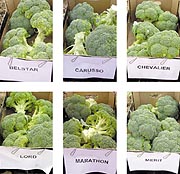Broccoli Fights Cancer

If broccoli could be sold as a prescription drug, it would be headline news. That's because it offers a vast array of cancer-fighting compounds. Over the past 20 years, numerous studies have concluded again and again that people who eat an abundance of broccoli have fewer cancers of the colon, breast, cervix, lungs, prostate, esophagus, larynx, and bladder. Broccoli contains indoles, which can help inactivate harmful estrogens that can promote the growth of tumors, sulforaphane, which stimulates cells to produce cancer-fighting enzymes, and beta-carotene, another cancer fighter.
The most important indole in broccoli — indole-3-carbinol, or I3C — is thought to be an especially effective breast cancer prevention agent.
The phytochemical sulforaphane, a product of glucoraphanin, is believed to aid in preventing some types of cancer, like colon and rectal cancer. Sulforaphane induces the production of certain enzymes that can deactivate free radicals and carcinogens. The enzymes have been shown to inhibit the growth of tumors in laboratory animals. However, be aware that the US Agriculture Department studied 71 types of broccoli plants and found a 30-fold difference in the amounts of glucoraphanin. It appears that the more bitter the broccoli is, the more glucoraphanin it has. Broccoli sprouts have been developed under the trade name BroccoSprouts that have a consistent level of sulforaphane — as much as 20 times higher than the levels found in mature heads of broccoli.
Broccoli also contains a class of potent anti-carcinogens (cancer-combating agents) called isothiocyanates. These compounds block many cancer-causing agents in a wide variety of cancers. But before deciding that isothiocyanates are a cure-all, it's useful to note that these sulfur compounds vary from one variety to another. For example, the SAGA-type contains an extraordinary source of isothiocyanates, while the Winchester variety has only a negligible supply. Odds are slim that the generic broccoli in your neighborhood store is a SAGA-type.
Of course, broccoli has more going for it than these nutrients. Broccoli is one of the richest vegetable sources of calcium, iron and magnesium. Moreover, broccoli is very rich in vitamin C, exceeding even oranges.
Horrors at the thought of eating broccoli every day just because it may help to prevent cancer? Then don't limit yourself to broccoli — expand your diet to include arugula, bok choy, Brussels sprouts, cabbage, Chinese cabbage, collards, kale, mizuna, mustard greens, rapini, tatsoi and watercress, which are all members of the Brassicaceae family.
And these twelve are just the best known leafy greens in the cabbage family; lesser known varieties abound in Asian markets and seed catalogues. And for you home gardeners, cabbage family members are hardy and easy to grow.
|